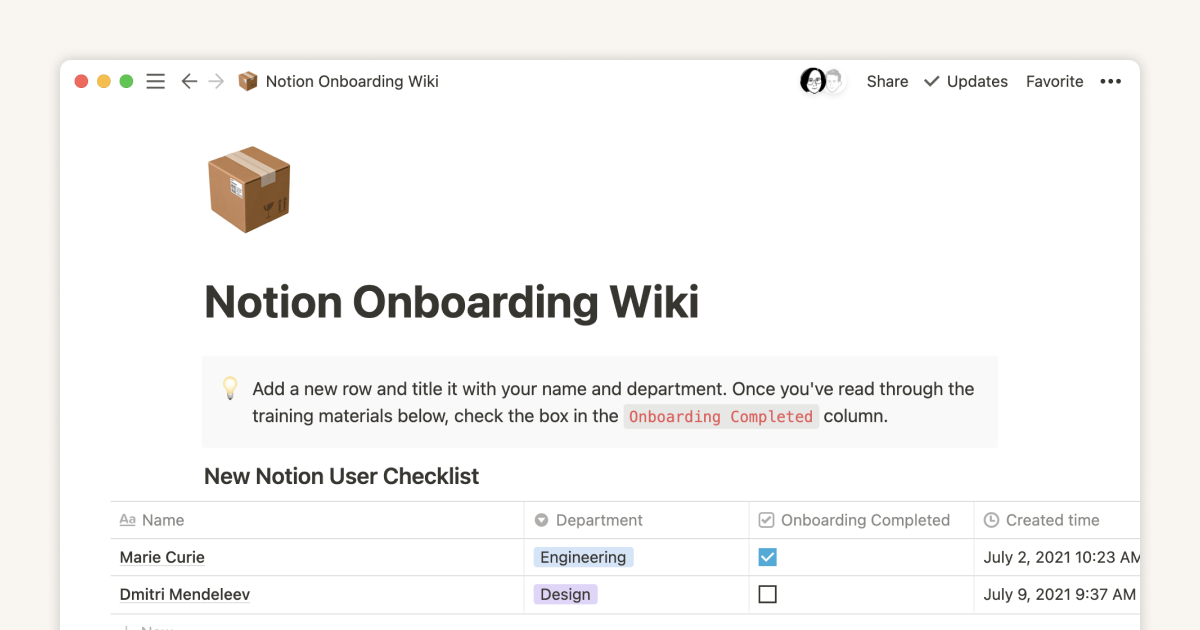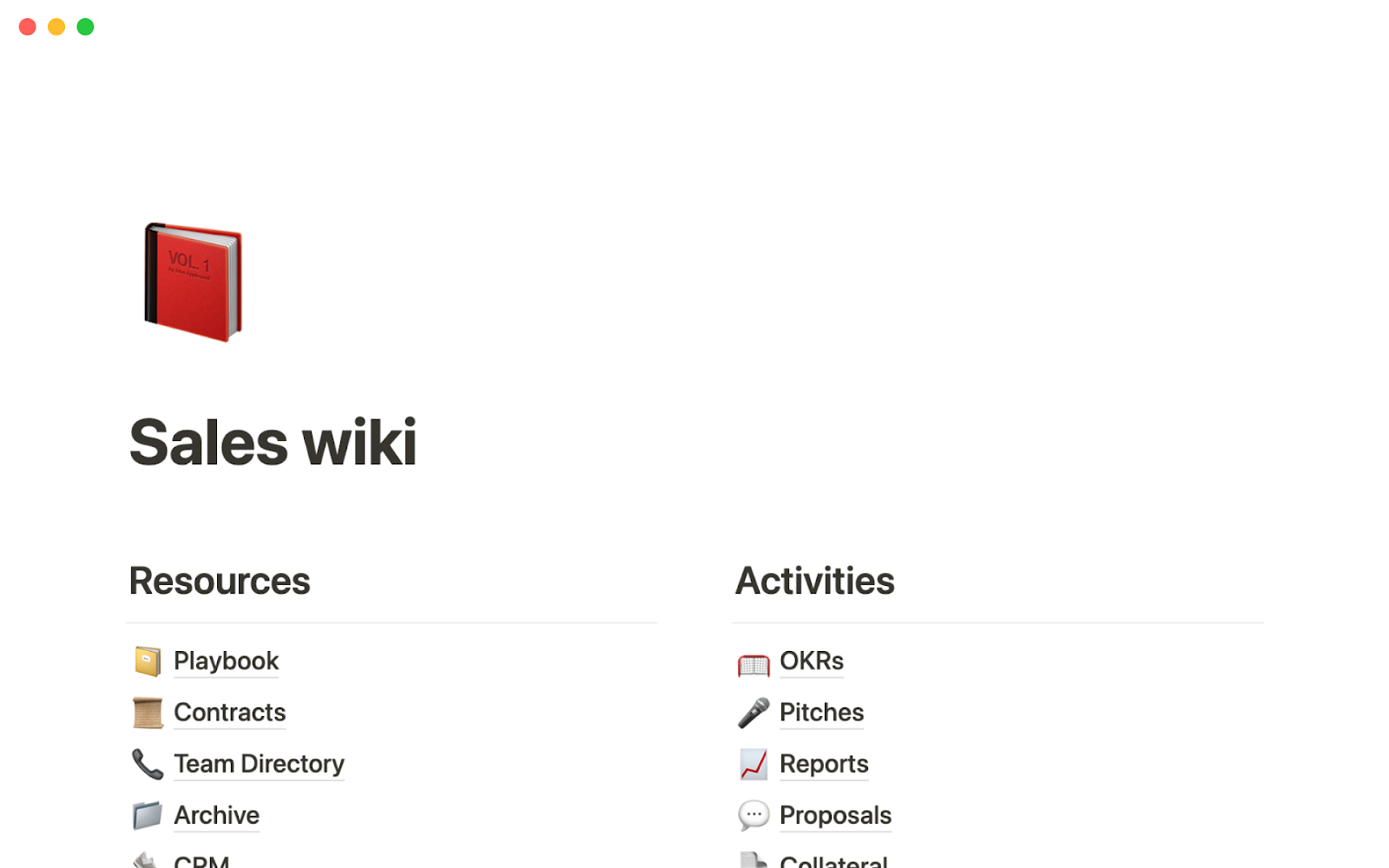

Who isn’t grateful for wikis? From better organization and online collaboration to a broader knowledge base, building out your collection of internal wikis is a sure way to improve productivity and efficiency.
Building a wiki in Notion makes it possible to share information among a team or group quickly and easily on a self-serve basis. It’s an easy solution for storing and sharing knowledge online so you get users onboarded quickly and move projects faster with accurate and reliable information shared across your network.
A wiki is a useful tool for building any kind of collaborative knowledge base. It features a collection of web pages that provide summarized information to an audience and in turn, the audience provides information to the wiki. You can think of wiki as a living document that can change daily.
It’s published online, but anyone with access can contribute with their insights, ideas, and expertise around the topics in a wiki so that others can benefit.
Notion features a wiki template for both beginners and pros. It comes with several built-in wiki templates, so there’s no need to start a wiki from scratch.
The Wiki was conceived and built as a codeless app development tool, so setting up a Wiki in Notion is very simple. Like any template in Notion, you can just jump in and change anything you need to.
To set up a Wiki in notion you can:


If you're not sure what onboarding is, it's the process of introducing new employees to your company and making them feel welcome. It's also the time when you can help them get the most out of their first few months on the job.
Using a wiki to create an onboarding document will make this process much easier because it allows everyone involved to interact with one another in real time. The wiki also makes it possible for everyone involved—including managers and leaders—to contribute valuable insights into how they see themselves as members of your team, which can help guide future employee relations efforts as well as current ones.

A sales wiki is a living, updating repository of your sales processes. A sales process can be defined as the series of steps that you take when interacting with your customers, from initial contact to order fulfillment.

A product wiki is a place to document the product. It's where you store all your documentation, including features, requirements, and bugs. It's also where you store design documentation for the product, as well as development information about the project: how it was built and why it was built that way.

An engineering wiki is a place to keep all the information that is needed to build the product. And it's also a place to keep all the information that is needed to ensure everyone aligned with the product.
While you can build a wiki in Notion, there are alternative wiki software tools you can use to build incredible wikis.

Almanac is by far one of the best wiki software tools out there, featuring:
You can also take advantage of expert tools such as Command Line, which allows users to perform any actions within the software through text exclusively.
Almanac also comes with rich-media support through Dynamic Elements and over 3000 open-source templates. If you’re looking for a quality wiki software with multiple functionalities, then Almanac is no doubt going to be the best option for wiki software for most users.
Take a look at this chart that shows exactly why:


Wiki.js is notable as an instance of an open-source wiki software suitable for corporate and business use. It offers fast performance by:
However, like all open-source software, Wiki.js lacks the same level of support and customer service that you might find with a subscription-based wiki software, as well as more advanced features such as organizational tools or powerful word-processing options.

Pricing
Despite its shortcomings, it is free, which is a big plus!

With a focus on a minimalistic UI, Slite provides a simple and intuitive user interface and experience. With support for graphics and rich-media content, you’ll be able to use a variety of resources in document entries using Slite, including materials from the free Wikimedia Commons.
However, the document editor is otherwise highly simplified, and it lacks organizational tools to help streamline and expedite access to information without the use of its search function.

Pricing
Slite offers a free service tier for up to 50 documents, and then:
There are three types of wikis:
Often, when internal wikis are mentioned this refers to group wikis that are made into internal-use encyclopedias. Internal-use encyclopedias are similar to Wikipedia and similar wiki sites but are very different from the standpoint that they are only meant to be read by the organization’s members and not the general public.
A single contributor wiki is made by one person and a group or team wiki is as the name suggests, made by varying members in an organization.
Wikis support organizational knowledge management by helping you store your knowledge in one place. Instead of housing ideas in different documents or even different computers, wikis allow teams to collectively record knowledge as they acquire it, and then keep it until it’s needed even if that is years later.
Keeping company-wide information organized is no easy task, especially when teams are working on different items with different goals. Using a wiki allows for all content to be added in one place, edited by all, and organized in a way that’s easy for all groups to understand.
Wikis help organizations make information more user-friendly and easily accessible to all members. Everybody has access to information as long as they have access to the internet. And of course, since the Internet is literally everywhere – on the smartphones in our pockets, the laptop computer at our desks, and even through our televisions – this information is always readily on hand.
Plus, they also make sure that important things (like key operation information) can still be readily accessible to the rest of the company when needed.
Wikis allow for knowledge to be alive: you can continue to edit and change documents over time as company policies or product ideas or anything else changes. Of course, that means it’s important to maintain your wiki’s organization.
Fortunately, most internal wiki softwares have built-in tracking functions. They can tell who edited what and when. You could also revive old versions in case the latest ones aren’t the most efficient.
Building your next Wiki with Almanac is the best choice you can make. With Almanac, you have all-in-one wikis tools, namely knowledge management, async collaboration, and public documentation.
Whether you’re building employee handbooks or managing your product roadmaps, creating a wiki for online document storage is a great way to keep processes organized, team members updated, and work flowing smoothly.